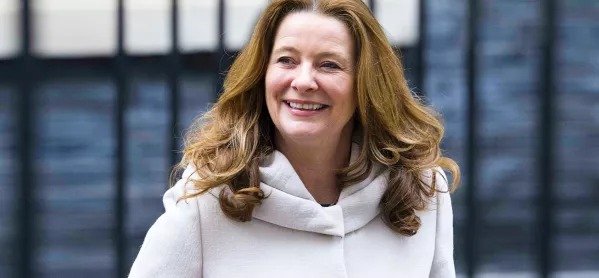Keegan urges NEU to call off next week’s strike for pay talks

The education secretary Gillian Keegan has invited unions to formal talks over pay on the condition that next week’s teacher strikes are called off.
Members of the NEU teaching union are set to walk out over pay in the Northern, North West and Yorkshire and the Humber regions on Tuesday 28 February, with further regional action set to take place later that week.
Ms Keegan has now written to education unions, inviting them to ”build on the constructive discussions that have already taken place and move into formal talks on pay, conditions and reform”.
However, a Department for Education spokesperson said: “A condition of these talks will be that the National Education Union calls off next week’s strike action.”
Responding to this, Kevin Courtney, joint general secretary of the NEU, said there was ”nothing substantial in the secretary of state’s letter that suggests to us we should call off strikes for next week.
But he added that the union’s executive could make a decision to do so when it meets at the weekend.
- Exclusive: Budget snub could lead to heads’ union strike ballot
- Teacher strikes: Further walkouts could be on the cards
- Pay talks: ’Dithering’ will ‘deepen teachers’ anger’, Keegan warned
The DfE spokesperson said that the department hopes to “find a fair and reasonable settlement that recognises the vital role teachers play while acknowledging the wider economic pressures facing the country and the government’s priority to halve inflation”.
The department has also published its evidence on next year’s teacher pay award tonight - proposing an increase of 3.5 per cent on average - and three per cent for experienced teachers.
Responding to Ms Keegan’s latest letter, Mr Courtney said: ”The NEU is pleased that the secretary of state has agreed with the prime minister and chancellor to move into substantive formal talks with the NEU to end the dispute between us.
“Our dispute is about seeking pay increases for teachers, which at least match price increases, and for any pay rises to be fully funded in school budgets.”
He added: ”However, the letter from the DfE offering talks still contains no suggestion that they are willing to talk about pay rises this year and are willing to fund them.
“And the DfE’s evidence to the School Teachers’ Review Body, published today, suggests a pay rise of 3 per cent for experienced teachers for next September. This is still less than the current forecast for RPI and CPI inflation for quarter three this year - so that projected rise will amount to a further pay cut on top of the already substantial pay cuts since 2010.
“We are willing to talk at any time: but there is nothing substantial in the secretary of state’s letter that suggests to us we should call off strikes for next week.”
Unions met with Ms Keegan last week to discuss teacher pay for the first time since the NEU carried out its first national strike day on 1 February.
Talks between unions and DfE officials have also taken place today but were focused on reducing teacher and leader workload.
Commenting on these talks, Geoff Barton, general secretary of the Association of School and College Leaders, said: “While today’s talks were polite, they were frankly meandering and with industrial action on the horizon once again, it is actions that are now required.
“We are pleased to have been invited to further formal talks on pay with the secretary of state later this week. We hope these discussions will have a greater degree of urgency and ultimately result in the long-overdue improvements to teacher pay and conditions that are needed to end this dispute. That is surely in the best interests of children and young people.”
Paul Whiteman, general secretary of the NAHT school leaders’ union, said: “We welcome the invitation to intensive talks with the DfE over the coming days in an attempt to resolve this dispute.
“We fully expect discussions on pay to be central to those meetings and a fair offer will be key to moving beyond the polite discussions so far to a point where we can hope for tangible progress towards an agreement.
“However, we have no control over action by a fellow union and it would be naive beyond belief for the DfE to pull the plug on these talks even before they have begun on that basis.
“That would demonstrate a government out of its depth when it comes to industrial relations with little clue about what it takes to come to an agreement.”
Register with Tes and you can read two free articles every month plus you'll have access to our range of award-winning newsletters.
Keep reading with our special offer!
You’ve reached your limit of free articles this month.
- Unlimited access to all Tes magazine content
- Save your favourite articles and gift them to your colleagues
- Exclusive subscriber-only stories
- Over 200,000 archived articles
- Unlimited access to all Tes magazine content
- Save your favourite articles and gift them to your colleagues
- Exclusive subscriber-only stories
- Over 200,000 archived articles



